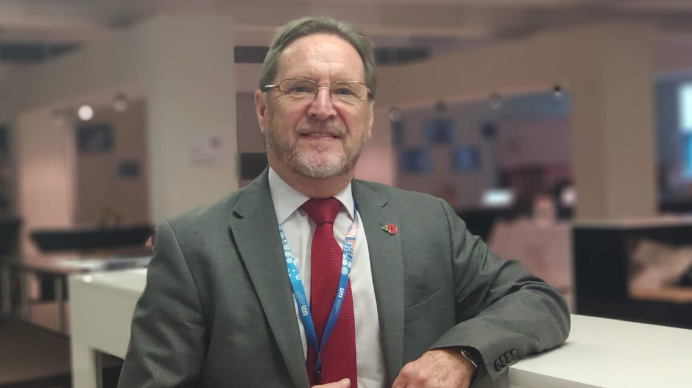
UPDATE from Lyon. September 1, 2022. At the end of August, Dr Subha Ramani was elected as the new AMEE president, succeding Prof Trevor Gibbs. A delegation from the Practicum Foundation attended her appointment in Lyon, where she expresed that she felt privileged to be adressing this leading international association for health professions educators. According to Prof Gibbs, Dr Ramani, who is originally from India, where she graduated in Internal Medicine, and works as an Associate Professor of Medicine at Harvard Medical School, is incredibly prepared for the position. Here her welcome speech an below an interview with the former president.
Feb 6, 2020 - Madrid. “Simulation offers professionals access to events that can otherwise not be directly observed, and in a safe and controlled environment”. For Prof Trevor Gibbs, President of the Association for Medical Education in Europe (AMEE), “the simulation-based programme Practicum Script represents a dynamic approach to an effective domain and the training on clinical reasoning Practicum Universities seems like the thing to be done in undergraduate education.” In his opinion, “this logic may be specifically relevant for constrained countries, where often it is not possible to practice on real patients”.
Graduating from the University of Liverpool, Prof Gibbs’ early career was in Oncology, before becoming a General Practitioner in his country. Following a successful career in the UK, his interest in medical education has given him the opportunity to settle down in many parts of the world, supporting the development of new curricula, mostly in those regions in which healthcare is still a challenge. Actually, this interview took place during a quick encounter in Poland during the last conference of EBMA and by email from Madrid/Singapore during one of his trips. He feels that “one vital component that needs greater emphasis everywhere is the recognition given to the specialty of medical education.”
According to Prof Gibbs, “we must recognize the world of education and learning is fast changing and we need to continue to show innovation in educational methods, which I suppose supports what you are doing (referring to Practicum Script).” As a major global medical education body, “AMEE's principles are about creating opportunities to facilitate health professionals education on an international basis and, as an institutional member, that provides you an enormous exhibition platform." Without showing favours, AMEE provides Institutions with a vast framework to share new approaches to curriculum planning, assessment techniques and educational management, in response to advances in medicine, patient demands and educational thinking.
- At this point you’ve written extensively on the subject of Medical Education, with a special interest in Curriculum Development....what are the main gaps in the medical degree right now?
- Well, I could mention so many… Recognition, methodology, faculty development, know-how in regards to teaching, assessment fit for purpose (for the real world) and leadership are the first ones to come to my mind. The main issues are bringing modern educational methods to those distant and more historical countries, given that good medical education means better healthcare. There are many problems with this, including context, culture, politics, ethics and, for sure, finances.
- You just said 'assesment fit for purpose, for the real world'… How can simulation-based education and training help future practitioners?
- We must remember to evaluate everything that we do (are the educational tools fit for purpose)? I’d like our newly qualified doctors to be able to say ‘I know how to manage the situations I’m going to encounter.’ Competency is a very hot topic across all of higher education and putting the focus on dealing with uncertainty is certainly an accurate approach to the clinical setting. Additionally, clinical reasoning is very important and vital, but with the changing behaviour of patients, the change in societal expectations and the changing disease patterns, then clinical reasoning is more dynamic than static. In this sense, patient safety becomes very important now and being safe and competent go hand in hand. Simulation is therefore extremely important as a protection for patients.
Along these lines, helping to diagnose problems and test new approaches before they are deployed for real could be understood as one of the main advantages of simulation in healthcare. Its ability to reproduce an aspect of clinical care and enable learners to practice in a safe environment proves its effectiveness in achieving practice goals. Practicum Script and its pilot application to senior medical students, known as Praticum Universities, provide a convenient way to focus on practical outcomes and measure those outcomes. Functional competencies are aligned with clinical practice. Prof Gibbs remarks that “becoming a competent practitioner should start with initiatives based on applying evidence-based concepts in practice.” Clarifying expectations for students might be the key.
Our personalized help center enables you to obtain technical support and help for navigating through the site and using the program.